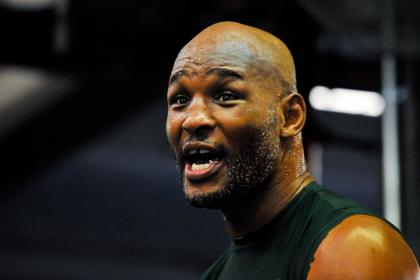How Bernard Hopkins uses talk of race to turn the spotlight on himself
ATLANTIC CITY, N.J. – In 1993, a few days before Tommy Morrison defeated George Foreman for the WBO heavyweight title, a longtime boxing official was marveling at the crowd that surrounded Morrison.
Foreman was by far the bigger name, but Morrison had attracted a far larger throng of reporters and autograph seekers.
"See that," the official said to me, knowingly, as Morrison made his way through a sea of people who were looking to shake his hand, pat him on the back or simply be in his presence. "Never forget that. There is nothing more valuable in boxing than a white heavyweight champion."
I thought of that conversation several times this week, most recently after chatting with IBF/WBA light heavyweight champion Bernard Hopkins.
Hopkins will face Sergey Kovalev, who holds the WBO title, on Saturday at Boardwalk Hall in an HBO-televised bout that will occur about two months before his 50th birthday.
No fighter is more aware of his place in history than Hopkins, who made things extraordinarily uncomfortable for some reporters this week by making many of his pre-fight remarks about race and its impact upon the perception of the bout.
The bout is a virtual sellout. Rest assured that by the time the first bell rings, the fire marshal will be holding his breath because Boardwalk Hall will be packed.
Hopkins-Kovalev will also likely garner the highest rating for a match on HBO this year.
Hopkins knows that, but it's not enough to satisfy him. He's said repeatedly that the reason his quest to extend his own record as the oldest man to ever win a major world championship hasn't gotten more attention is because of his race.
Hopkins is black, Kovalev is white, and Hopkins believes that his race, in particular, is a reason for what he sees as a less-than-spectacular reaction to his title run.
"I want you to think about this for a minute," Hopkins said. "Think real carefully about this: Imagine what the reaction would be if I was this age and playing for the Yankees and hitting all these home runs and breaking these records. Think about that. What would be happening?"
It would be monster wall-to-wall coverage, of course, but that probably has more to do with the relative place of Major League Baseball vs. boxing in today's society than it does with race.
But is there some validity to Hopkins' viewpoint? Are racial undertones playing a role in the reaction to his feat?
Well, race plays as big a factor in boxing as it does in any sport.
Boxing has always used race to promote fights. Caucasians are often dubbed "The Great White Hope," particularly if they're heavyweights. And it is no secret that promoters would routinely pit white fighters against black ones in big televised fights to try to drive up ratings.
We've all heard trainers, promoters, fighters and managers talk about fighting styles in racial terms. But the simple question we must confront is whether Hopkins' achievement would be treated the same way if he were white.
When Cal Ripken Jr. broke Lou Gehrig's consecutive games played mark in baseball in 1995, it got about as much attention in the media as coverage of a presidential election.
Ripken was a respected, beloved figure in the sport and playing in 2,131 consecutive games was a mind-boggling feat. But let's be honest: It didn't hurt the coverage that he was white and agreeable.
Boxing for a world title a few weeks short of one's 50th birthday against the No. 1 guy in the division is parallel, in many ways, to Ripken's baseball record. But Hopkins isn't perceived as a lovable character like Ripken was.

Hopkins is a convicted felon who served time in Pennsylvania's Graterford State Prison on a strong-arm robbery conviction. That he's turned around his life and been a role model of sorts is lost on many.
He's become a clean-living, savvy and brilliant businessman. He has also built an impressive financial empire with major real estate investments in his native Philadelphia.
Yet he's outspoken and controversial, so despite the good he's done, the perception of him has been slow to change.
But never forget he’s a calculating, cunning man, and he does everything for a reason.
There is indeed some truth to his comments about race, but this is also Hopkins shrewdly finding a way to turn the spotlight in his direction. Tell a reporter for a major website, newspaper or network that you're being overlooked because of your race and, voila, you've created a major national story.
Hopkins is a master, both in and out of the ring.
He uses the philosophy of the late, great Pittsburgh Steelers coach Chuck Noll, who would always say, "Whatever it takes." That became a catchphrase for the Steelers' dynasty teams that won four Super Bowl titles in a six-year span in the 1970s.
Like the Steelers of the '70s, Hopkins does whatever it takes.
No question, he'd be more celebrated if he were more like Ripken in his quest to win a title at 50. But it's also unquestionably true that Hopkins shrewdly used the bully pulpit to shine a light on the issue to hype interest and drive ratings for the fight.
He's not wrong when he says race is a factor in the perception of his record pursuit. But it's just like Hopkins to find a negative and turn it into something that helps him.

 Yahoo Sports
Yahoo Sports